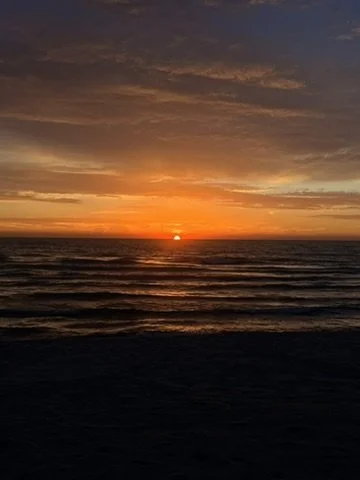This Week on Earth: October 20-26
Sunrise at Clark St. Beach on Indigenous Peoples’ Day, October 24, 2025 (Lula Fox/ION)
Evanston
At Ebenezer AME Church on Wednesday, consultants from the urban design consulting collective MKSK gathered feedback from Evanston residents on the actions they drafted to improve environmental equity in Evanston after a year of investigation.
This investigation began in the last months of 2024 as a result of the City Council’s adoption of the Environmental Justice Resolution in 2020 that recognized how historical injustices led to environmental disparities in Evanston today, according to Evanston Roundtable in April. The meeting on Wednesday is the fourth public workshop where consultants gathered community input.
The consultants showed their recommendations in the four key areas they identified: open space, parks and trees; housing and development; streets and transportation; and community services. Recommendations include putting investments into building a more accessible walking and cycling route, and planting trees in areas where private space is limited due to historical redlining. Residents had a chance to see the recommendations and provide feedback such as what they want to prioritize in the recommendations.
“We need to come together as a community to talk about what’s right for our community, and what’s right for one part of Evanston might be different from what’s right for another part of Evanston,” Brett Weidl, a consultant of the firm said. “That’s something that we need to address in this report.” A report is expected to be completed by the end of the year, according to Evanston Roundtable.
Alaska
On Thursday, the Trump administration announced new plans for oil and gas drilling projects in the entire 1.56 million acre coastal plain of Alaska's Arctic National Wildlife Refuge. The action is a continuation of President Trump’s tax bill in his first term that required two oil and gas lease sales in the coastal plain, a mandate canceled by the Biden administration, according to the New York Times.
Despite President Trump’s plans to increase drilling in Alaska, oil companies and major banks have not been interested in projects in Alaska, according to the New York Times. The Guardian reported that environmental groups including the Alaska Wilderness League, EarthJustice, and SierraClub voiced opposition to Thursday’s announcement,
These lands are considered sacred to the Gwich’in Nation, as they sustain culturally significant species and traditional practices. The drilling projects could threaten polar bear populations in the refuge.
Alaska Natives have different attitudes towards drilling. The NPR reported that the leaders of Kaktovic, an Iñupiaq community in the wilderness, saw the potential economic benefits of the drilling. Kristen Moreland, a member of the Gwich’in Nation, argued that the projects would threaten caribou hunting and other cultural practices, according to the New York Times.
India
India’s Bharatiya Janata party (BJP) on Thursday launched its first trial to use cloud seeding to bring down air pollution in Delhi. Artificial rains are expected Oct. 29, but experts express concerns over the effectiveness of cloud seeding to reduce air pollution and its long-term effects, the Guardian reported.
Cloud seeding is a process of releasing particles of silver iodide into the atmosphere to change the structures of the clouds to increase precipitation. However, two professors at Delhi’s Centre for Atmospheric Sciences, Shahzad Gani and Krishna Achuta Rao, emphasized that little is known about how repeated release of chemicals into the atmosphere could affect human health and agriculture, according to the Guardian.
This week’s newsletter was written by Coco Yang — cocoyang2029@u.northwestern.edu.
Visit our website for past editions of This Week on Earth
Follow us @inournaturemag on Instagram and Twitter
Email us at inournaturemag@gmail.com

